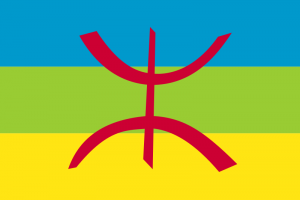Language/Standard-moroccan-tamazight/Grammar/Nouns
Hi Standard Moroccan Tamazight learners! 😊
In this lesson, we will focus on nouns in Standard Moroccan Tamazight. Nouns are one of the foundational components of any language, and they are essential to achieve fluency. By the end of this lesson, you will have a strong understanding of Standard Moroccan Tamazight nouns and be able to use them confidently in your daily conversations.
Introduction[edit | edit source]
Nouns are words used to name people, places, things, and ideas. They are the backbone of a language and are used in every sentence. In Standard Moroccan Tamazight, nouns are either masculine or feminine, and they are not marked by articles such as "a" or "an". Instead, a word's gender can be determined by the sound of the last letter.
For example, most nouns ending in "a" are feminine, while most nouns ending in "i" or "u" are masculine. There are also many irregular nouns that do not follow this pattern.
In this lesson, we will explore the different types of nouns, their gender, and how to make them plural. Let's get started!
Once you've mastered this lesson, take a look at these related pages: Verb to be, Plurals, How to Use Be & How to Use Have.
Types of Nouns[edit | edit source]
There are several types of nouns in Standard Moroccan Tamazight:
Proper Nouns[edit | edit source]
A proper noun is a specific name given to a person, place, or thing. Proper nouns always begin with a capital letter. Here are some examples:
| Standard Moroccan Tamazight | Pronunciation | English |
|---|---|---|
| ⵎⵓⵔⵏⵉⵏ | /mur.nin/ | Marrakesh |
| ⴰⵜⵉⵔⵉ | /a.ti.ri/ | Aitiri |
| ⴰⴷⴼⴰ | /a.d.fa/ | Adfa |
Common Nouns[edit | edit source]
A common noun is a word used to describe a general group of people, places, or things. Here are some examples:
| Standard Moroccan Tamazight | Pronunciation | English |
|---|---|---|
| ⴰⴳⵓⴱⵓⵏ | /a.gu.bun/ | Night |
| ⵜⵜⵓⵎ | /ttum/ | Door |
| ⵜⵜⴰⵎⵔⵓⵏ | /ttam.run/ | Windows |
Collective Nouns[edit | edit source]
Collective nouns refer to a group of people, animals, or things. In Standard Moroccan Tamazight, collective nouns are grammatically singular even if they refer to multiple individuals. Here are some examples:
| Standard Moroccan Tamazight | Pronunciation | English |
|---|---|---|
| ⴰⴷⴰⴷⴰⴽ ⵙⴰⵄⴽⴰⴷⵉⴳⴳⴰⵁ | /a.da.da.k sa.a.ka.di.gga/ | Group of friends |
| ⵜⵜⴰⵛⴰ | /tta.tʃa/ | Herd |
| ⴰⴷⴼⴰⵃ | /a.d.faħ/ | Crowd |
Abstract Nouns[edit | edit source]
Abstract nouns refer to ideas, emotions, or concepts that cannot be seen or touched. They are often difficult to define and can be either masculine or feminine in Standard Moroccan Tamazight. Here are some examples:
| Standard Moroccan Tamazight | Pronunciation | English |
|---|---|---|
| ⵜⵜⴰⵕⵜ | /ttart/ | Love |
| ⴰⴼⴰⴽ | /a.fa.k/ | Honesty |
| ⵜⵜⴰⵍⵜ | /ttalt/ | Courage |
Gender of Nouns[edit | edit source]
In Standard Moroccan Tamazight, nouns are either masculine or feminine. Unlike in some other languages, gender is not solely determined by the biological sex of the person, animal, or object being described.
Instead, the gender of a noun is sometimes determined by the last letter of the word, with most words ending in "a" being feminine and most words ending in "i" or "u" being masculine. However, there are many exceptions to this rule, and you will need to memorize the gender of each noun as you learn it.
To illustrate, here are some examples of nouns with their gender:
| Standard Moroccan Tamazight | Pronunciation | English |
|---|---|---|
| ⴰⵓⵍⴰⵜ | /a.u.lat/ | Ewe (feminine) |
| ⴰⴱⴽⴰⴷ | /a.b.kad/ | Mouse (masculine) |
| ⵉⵜⵜⵉⵖ | /it.ttiɣ/ | Tangerine (feminine) |
| ⵎⵉⵣⵉⵖ | /mi.ziɣ/ | Cooked meat (masculine) |
Plurals of Nouns[edit | edit source]
In Standard Moroccan Tamazight, most masculine nouns are made plural by adding "-in" to the end of the word, while feminine nouns are made plural by adding "-at". There are, however, many irregular nouns that do not follow this pattern. Here are some examples:
| Standard Moroccan Tamazight Singular | Standard Moroccan Tamazight Plural | English |
|---|---|---|
| ⵜⵜⴰⵍⵜ | ⵜⵜⴰⵍⵜⴰⵢⴻⵔ | Courage (m) |
| ⵎⵉⵢⵢⵉ | ⵎⵉⵢⵉⵢⴻⵏ | Cats (m) |
| ⵓⵎⵓⴷ | ⵜⴰⴷⴷⴰⴷⵉⴳⴳⴰⵢⴻⵔ | Sheep (f) |
| ⴰⴳⵓⴱⵓⵏ | ⴰⴳⵓⴱⵓⵏⴰⵜ | Nights (f) |
Dialogue[edit | edit source]
To wrap up the lesson, let's practice what we've learned in a short dialogue.
- Person 1: ⴰⵍⵍⵉⵡⴰⵏ ⴰⵎⴰⵣⵉⵖ ⵏ ⵉⵎⵔⵉⵔ? (Alliwann amazigh n imrir? - Do you speak Tamazight?)
- Person 2: ⵏⵉⵣⵉⵖⵏ ⵏ ⵉⵎⵔⵉⵔ. ⵓⵎⵓⴰⵜ ⵜⵜⴰⵍⵜ ⴰⴼⴰⴱⵉⵜ. (Nizign n imrir. Umaṭṭalt ttalt afabit. - I speak Tamazight. I love its vocabulary.)
- Person 1: ⴰⴼⴰⴹ ⴰⴷⴰ ⵜⵜⴰⵛⴰ𝔢ⵜ? (Afad ad ațaḍaɛt? - Can you close the door?)
- Person 2: ⵓⵜ ⵜⵜⵓⵎ. (Ut ttum. - Sure, I will.)
Sources[edit | edit source]
➡ If you have any questions, please ask them in the comments section below.
➡ Feel free to edit this wiki page if you think it can be improved. 😎
Other Lessons[edit | edit source]
- How to Use Be
- Possessive pronouns
- Verb to be
- Questions
- Future Tense
- Negation
- How to Use Have
- Verb have in tamazight
- Plurals
- Pronouns

